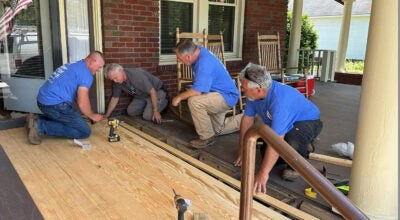Despite progress, stigma remains for many suffering with mental illness
Published 12:00 am Wednesday, December 2, 2009
By Kathy Chaffin
Salisbury PostYears ago, when she attended a National Alliance on Mental Illness support group meeting in Blowing Rock, Sarah Boyd says she spent several minutes talking to a woman there.
“We had an open conversation going,” she recalls, “and then she asked me if I had a family member with a mental illness. I told her no, that I was the one with mental illness.
“Abruptly, things changed. She just quit talking to me and walked away.”
That was one of many situations in her life where Boyd says she was treated differently.
Things have changed through the years, but she contends there’s still a stigma associated with mental illness.
It’s a stigma Boyd hopes to help eliminate.
She was one of the founders of a local chapter of the National Alliance on Mental Illness, called NAMI Rowan, in September of 1999.
And at age 65, she shares her own story every chance she gets as a presenter for NAMI’s “In Our Own Voice: Living with Mental Illness” education program and trains others to share their stories as well.
This is the story of Sarah Boyd’s battle with mental illness. It is a story of a life plunged into deep despair and the gradual knowledge and acceptance that made it bearable and ultimately, filled with hope and joy.
– – –
It wasn’t until she was 26 that Boyd began to wonder what was wrong with her. Her father’s sudden death from a heart attack plummeted her into severe depression, and she couldn’t seem to rise out of it.
“I did not want to do anything with anybody,” she says. “I really isolated myself from my family.”
Eight months later, Boyd and her husband separated. He moved out, leaving her and their three children behind.
After their 1970 divorce, Boyd’s depression worsened, and she and the children went to stay with her mother in Blowing Rock for a few days.
A Morganton psychiatrist had given her a prescription, but Boyd says she was afraid to take it. When she took one to combat a severe headache, she ended up collapsing on the stairway.
Her mother took her to the hospital, where she underwent six weeks of treatment for depression and malnutrition. Her weight had dropped to 89 pounds.
At no point during that time did anyone talk to Boyd about mental illness. Her doctor said he thought she had a chemical imbalance, but didn’t know what it was.
He released her with a prescription for an anti-psychotic drug, saying she would need to take it for the rest of her life.
– – –
Boyd and the children returned to Morganton, where she went back to her job with an optometrist.
The medication made her sleepy, and she had difficulty concentrating. “When I got home in the evenings,” she says, “I would go to bed and sleep until the next morning.”
Boyd had no family or close friends in Morganton to call on for support, but help arrived in the form of a disabled veteran whom she married a year after her hospitalization.
When she went back to work after her honeymoon, Boyd says she was handed a note saying she no longer had a job. No reason was given.
“The only thing I could think of was after the hospitalization, I guess my work performance was not as good as it was before.”
This would be the first of several times Boyd’s mental illness would interfere with her employment.
– – –
After divorcing her second husband in 1980, she met Robin Boyd, who worked at Hoechst Celanese in Rowan County.
They married in 1982, after which she accepted a temporary position with the Employment Security Commission in Kannapolis. When that job ended, Boyd went to work for a senior citizens agency in Rowan County.
About three years later, pressures from the job began to affect her mental state, and her doctor recommended that she take some time off. When her request for annual leave was denied, Boyd says she felt she had no option but to resign.
Three months later, in May of 1987, she had her first relapse.
It was at this point that Boyd experienced her first psychotic episode. She was driving her daughter, Angela, and her 8-month-old grandson, Jason, to Florida when it happened.
She and her daughter got into an argument about who should drive. “I was in such a state of mind, I was like ‘if you want to get out, get out,’ ” she says. Angela did, her son in her arms, and Boyd drove off and left them.
She kept driving for three days and three nights.
“I knew I needed some sleep,” she says, “but I was afraid something would happen to me, so I just kept driving.”
It was only when she wrecked her car in Orangeburg, S.C., that she stopped.
Her mother and husband picked her up and arranged for her to be admitted to Forsyth Medical Center in Winston-Salem for three weeks.
It would be years later, after she requested a copy of her medical records, before she would read her diagnosis of schizoaffective disorder ó a condition causing impairments in the perception or expression of reality.
– – –
In May of 1988, she relapsed again and went on driving, wrecking her car on a parkway in Tennessee. She ended up back at Forsyth, where she was told one of the medications prescribed during her previous hospitalization may have contributed to the relapse.
“This is not unusual with mental illness,” she says. “It’s sometimes difficult to get the right medication.”
She was placed in the psychiatric ward for three weeks and discharged. She found a job at a Salisbury nursing home and went back to work.
In November of that year, she had a third relapse, ending up in Maryland.
Boyd sat in her car in front of a closed service station from Friday until Monday before someone called the police to help her.
Her husband and mother went after her, and she was hospitalized again. Doctors adjusted her medicine, prescribing another antipsychotic drug.
The medicine worked, and Boyd was able to return to work. A few months later, Boyd says an administrator heard about the episode and told her she could resign or be fired.
Boyd resigned so she wouldn’t have a firing on her work record. That would have been a good case to take to the Equal Employment Opportunity Commission, she says, because there are labor laws protecting employees with mental illness.
After that, she worked for a Salisbury attorney for three years, teaching at Salisbury Business College at night.
Boyd had another relapse in 1998 when she stopped taking her medication to try herbal alternatives.
She drove to Charleston, where a highway patrolman took her to the emergency room. It was there that she had her first involuntary commitment to a psychiatric center.
– – –
It was while staying with her mother after her discharge that Boyd attended the meeting of High Country NAMI in Boone.
A year after helping to start NAMI Rowan, she suffered yet another relapse. She was given a second diagnosis of bipolar disorder and treated on an outpatient basis.
In the eight years since then, Boyd’s life has changed for the better.
By connecting with other people with mental illness and researching her diagnoses, she has come to terms with her life.
She now has two part-time jobs helping others with mental illness to find their way to recovery.
“It was a rough, rough road to come to this point,” she says, “but I just came to the realization that God made me the way I am and that there was a reason for it.”
Contact Kathy Chaffin at 704-797-4249 or kchaffin@salisburypost.com.




